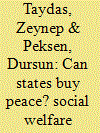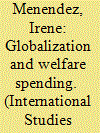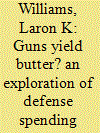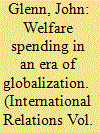|
|
|
Sort Order |
|
|
|
Items / Page
|
|
|
|
|
|
|
| Srl | Item |
| 1 |
ID:
112776


|
|
|
|
|
| Publication |
2012.
|
| Summary/Abstract |
This study examines whether the state's ability to provide social welfare services has any major effect on the probability of civil conflict onset. We argue that welfare spending contributes to sustaining peace because the provision of social services reduces grievances by offsetting the effects of poverty and inequality in society. Welfare spending serves as an indication of the commitment of the government to social services and reflects its priorities and dedication to citizens. By enacting welfare policies that improve the living standards of citizens, governments can co-opt the political opposition and decrease the incentives for organizing a rebellion. Utilizing time-series, cross-national data for the 1975-2005 period, the results indicate that as the level of the government investment in welfare policies (i.e. education, health, and social security) increases, the likelihood of civil conflict onset declines significantly, controlling for several other covariates of internal conflict. Additional data analysis shows that general public spending and military expenditures are unlikely to increase or decrease the probability of civil unrest. Overall, these findings suggest that certain types of public spending, such as welfare spending, might have a strong pacifying effect on civil conflict, and therefore the state's welfare efforts are vital for the maintenance of peace.
|
|
|
|
|
|
|
|
|
|
|
|
|
|
|
|
| 2 |
ID:
151276


|
|
|
|
|
| Summary/Abstract |
What explains variation in the relationship between globalization and public spending on compensation across countries? This article argues that the effect of trade exposure on compensation depends on economic geography and electoral institutions. It predicts that trade leads to greater compensation when trade losers are concentrated geographically and politicians have incentives to target specific constituencies. Policy proves least responsive where electoral districts are large and losers are concentrated. Moreover, in systems with small electoral districts, trade increases compensation when losers are concentrated relative to where they are dispersed. In systems with large electoral districts, trade increases compensation only when losers are dispersed. I evaluate these claims by using a panel of 14 developed democracies and a new measure of concentration. The results provide robust support for the argument. The implication is that there is no generalized relationship between globalization and spending. Rather, the welfare effects of globalization are shaped by fundamental considerations of political economy, such as geography and electoral institutions.
|
|
|
|
|
|
|
|
|
|
|
|
|
|
|
|
| 3 |
ID:
165884


|
|
|
|
|
| Summary/Abstract |
The popular notion of a trade-off between social and defense spending—or guns versus butter—appears often in elite discourse, popular media, and empirical studies of budgetary politics. Yet, there are good reasons to suspect that the public’s preferences for these types of spending do not reflect that trade-off. I develop a theory that whether social and defense spending preferences are competing or complementary depends on if the respondent views the government as an important contributor to job creation. Using data from fifty-nine surveys in twenty-seven countries from 1985 to 2008, I show that favoring government-financed job creation makes a respondent much more likely to view social and defense spending as complementary. Indeed, aside from the anomalous case of the United States, preferences are consistent with guns yield butter instead of guns versus butter. This theory has important implications for the thermostatic model of policy responsiveness and theories of budgetary politics.
|
|
|
|
|
|
|
|
|
|
|
|
|
|
|
|
| 4 |
ID:
087459


|
|
|
|
|
| Publication |
2009.
|
| Summary/Abstract |
This paper examines the assertion that economic globalization has led to the decline of welfare spending in recent decades. Although it is often argued that the increasing intensity of globalization has led to such a decline in the industrialized states, the paper finds that there has been little, if any, downturn in either levels of state expenditure in general or in levels of welfare spending in particular. However, the experience of the developing states has been rather different. In their case, the last few decades indicate that stagnation or a decline in welfare spending has occurred, particularly during the period of structural adjustment implementation. It is argued that the OECD countries still manage to provide a high level of social welfare to their populations that closely resembles the compensatory state model. In contradistinction, many of the states in the South have struggled to maintain their levels of social expenditure and therefore most resemble Cerny's competitive state model. In order to explain these two divergent outcomes, the paper examines the way in which the behaviour of certain key international financial actors (investors, multinational companies, international financial institutions) differs with regard to these two sets of countries.
|
|
|
|
|
|
|
|
|
|
|
|
|
|
|
|
|
|
|
|
|